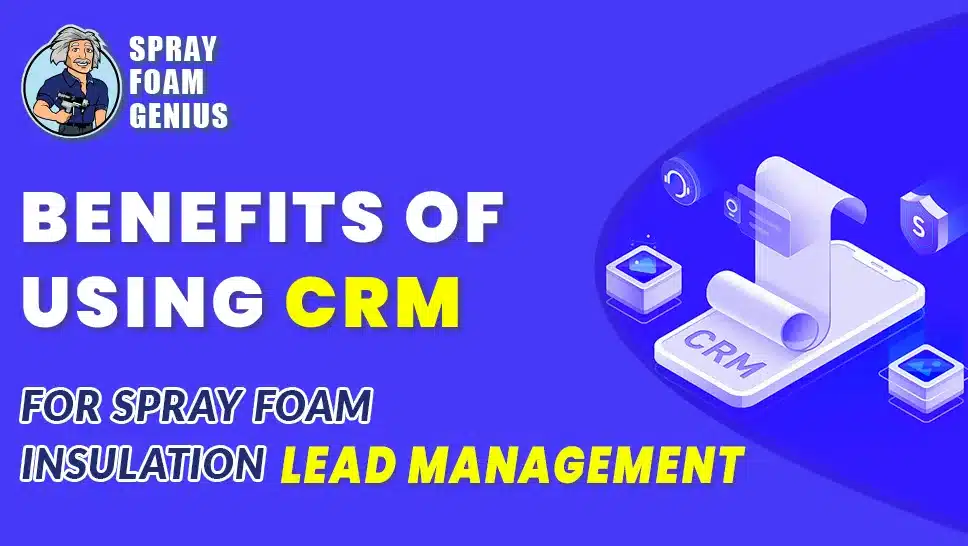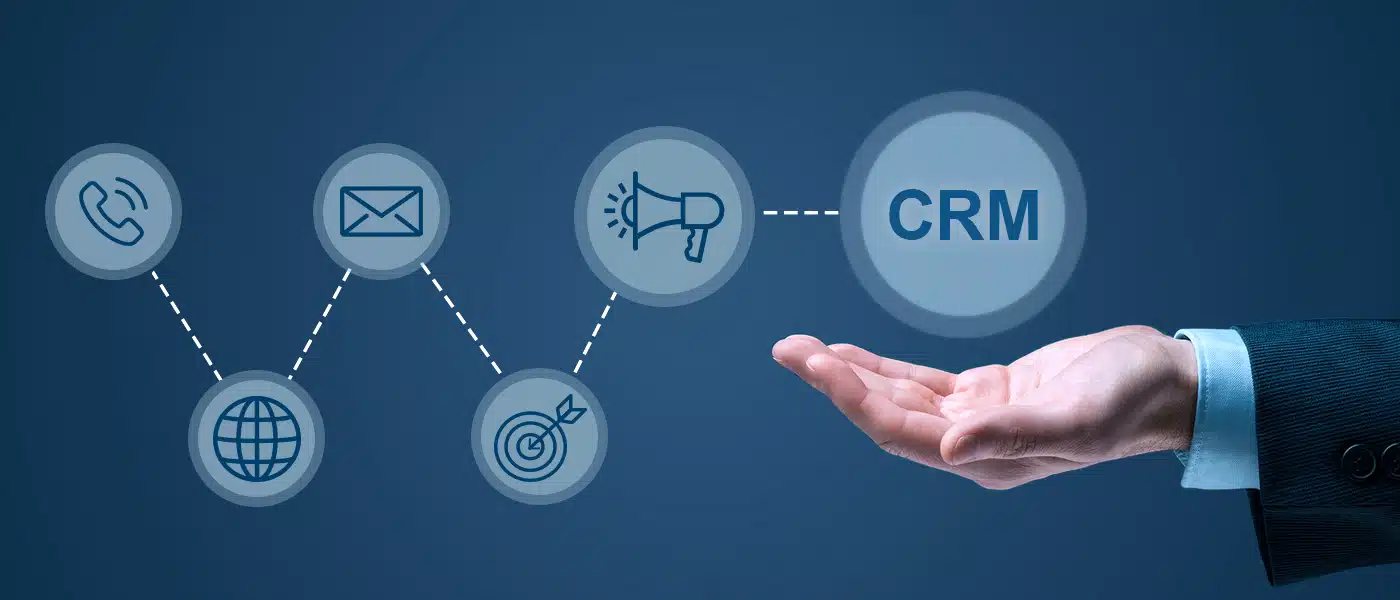
In the competitive landscape of spray foam insulation, managing leads effectively is crucial for business growth and customer satisfaction. As spray foam insulation contractors, you’re likely juggling various tasks—estimating projects, managing crews, and handling customer inquiries. To streamline your operations and enhance your CRM for Spray Foam Insulation Lead Management, adopting a Customer Relationship Management (CRM) system can be a game-changer. In this comprehensive guide, we’ll explore the myriad benefits of using CRM for lead management specifically tailored for spray foam insulation businesses.
Understanding CRM and Its Relevance for Spray Foam Insulation Contractors
Customer Relationship Management (CRM) is a technology for managing all your company’s relationships and interactions with potential and existing customers. A CRM system helps businesses stay connected with customers, streamline processes, and improve profitability. For spray foam insulation contractors, a CRM can manage and analyze customer interactions and data throughout the customer lifecycle, aiming to improve customer service relationships and assist in customer retention and satisfaction.
The Inverted Pyramid Strategy
This guide is structured to provide the most critical information at the beginning, with additional details and supporting evidence following in descending order of importance. This approach ensures that even if readers skim through the content, they will grasp the essential benefits and applications of CRM for their business.
Key Benefits of CRM for Spray Foam Insulation Lead Management
1. Centralized Lead Management
A CRM system consolidates all lead information into a single platform, making it easier to track and manage potential clients. For spray foam insulation contractors, this means:
- Unified Lead Tracking: All your lead data—such as contact details, project requirements, and communication history—is stored in one place. This centralization reduces the risk of losing valuable information and ensures that your team has access to up-to-date lead information.
- Streamlined Communication: With a CRM, you can easily track all interactions with potential customers, ensuring that follow-ups are timely and relevant. This helps in maintaining a consistent communication flow and prevents leads from slipping through the cracks.
2. Improved Lead Qualification
CRM systems provide tools to assess and score leads based on predefined criteria, such as budget, project scope, and readiness to proceed. This feature is particularly beneficial for spray foam insulation contractors because:
- Targeted Outreach: By scoring and prioritizing leads, you can focus your efforts on high-potential prospects who are more likely to convert. This targeted approach improves your sales efficiency and increases the chances of closing deals.
- Data-Driven Decisions: CRM systems offer analytics that helps you understand which lead sources are most effective and which types of leads convert best. This data-driven insight allows you to refine your marketing strategies and allocate resources more effectively.
3. Enhanced Customer Insights
Understanding your customers is crucial for tailoring your services and improving satisfaction. A CRM system offers:
- Detailed Customer Profiles: Each lead or customer profile can include detailed information such as past interactions, preferences, and project history. This comprehensive view helps you provide personalized service and anticipate customer needs.
- Behavioral Analytics: CRM tools can analyze customer behavior patterns, such as response times, preferred communication channels, and engagement levels. This information allows you to optimize your approach and improve overall customer experience.
4. Automated Follow-Ups and Reminders
One of the most significant advantages of a CRM system is its automation capabilities. For spray foam insulation contractors, automation can:
- Reduce Manual Work: Automate routine tasks such as sending follow-up emails, setting reminders for callbacks, and scheduling appointments. This automation not only saves time but also ensures that no lead is overlooked.
- Increase Efficiency: Automated reminders and follow-ups help keep your sales team organized and focused on high-priority tasks. This leads to improved productivity and faster response times, enhancing your overall customer service.
5. Enhanced Reporting and Analytics
CRM systems offer robust reporting and analytics tools that provide valuable insights into your lead management processes:
- Performance Tracking: Track key metrics such as lead conversion rates, average response times, and sales pipeline progress. These insights help you identify areas for improvement and measure the effectiveness of your lead management strategies.
- Customizable Reports: Generate reports tailored to your specific needs, such as lead source performance or project profitability. Customizable reports provide a clearer picture of your business performance and support data-driven decision-making.
6. Improved Collaboration and Communication
Effective collaboration among team members is essential for managing leads and delivering excellent customer service. A CRM system enhances collaboration by:
- Shared Access: Allow multiple team members to access lead information and updates in real time. This shared access ensures that everyone is on the same page and can contribute to the lead management process effectively.
- Integrated Communication Tools: Many CRM systems include built-in communication tools, such as email and chat features, that facilitate seamless interaction among team members. This integration helps in coordinating efforts and addressing customer needs more efficiently.
7. Seamless Integration with Other Tools
A CRM system can integrate with various other tools and platforms that you may already use, such as:
- Marketing Automation: Integrate with email marketing and social media platforms to synchronize your marketing efforts with your CRM. This integration ensures that your marketing campaigns are aligned with your lead management activities.
- Project Management Software: Connect with project management tools to track project progress and manage resources effectively. This integration provides a holistic view of your projects and helps in delivering timely and high-quality services.
8. Enhanced Customer Retention and Loyalty
Maintaining strong relationships with existing customers is as important as acquiring new leads. A CRM system supports customer retention by:
- Tracking Customer Interactions: Monitor and record all customer interactions, including feedback and service requests. This tracking helps you address issues promptly and improve overall customer satisfaction.
- Personalized Service: Use customer data to offer personalized services and promotions based on individual preferences and past interactions. Personalization enhances customer loyalty and increases the likelihood of repeat business.
Optimizing CRM for Spray Foam Insulation Lead Management

To maximize the benefits of a CRM system for your spray foam insulation business, consider the following optimization tips:
1. Choose the Right CRM System
Select a CRM system that aligns with your business needs and goals. Look for features specifically tailored to lead management, such as:
- Lead Scoring and Segmentation
- Automated Workflows and Follow-Ups
- Integration Capabilities with Other Tools
2. Train Your Team
Ensure that your team is well-trained in using the CRM system effectively. Provide comprehensive training sessions and ongoing support to help them get the most out of the system.
3. Regularly Review and Update CRM Data
Keep your CRM data up-to-date by regularly reviewing and updating lead information. This practice helps in maintaining data accuracy and improving the effectiveness of your lead management efforts.
4. Leverage CRM Analytics
Use the analytics and reporting features of your CRM system to gain insights into your lead management processes. Regularly review performance metrics and make data-driven adjustments to optimize your strategies.
5. Continuously Improve Your CRM Strategy
Stay informed about the latest CRM features and best practices. Continuously refine your CRM strategy to adapt to changing market conditions and customer expectations.
Ready to Transform Your Lead Management?
Implementing a CRM system can revolutionize your spray foam insulation business by enhancing lead management, improving customer relationships, and driving growth. At Spray Foam Genius Marketing, we specialize in helping spray foam insulation contractors like you leverage CRM systems and other digital marketing strategies to achieve your business goals.
To learn more about how we can support your lead management efforts and boost your business, Call us at 877-840-FOAM for USA and 844-741-FOAM for Canada visit our website at sprayfoamgeniusmarketing.com, or email us at [email protected] to get started.
Our team is ready to assist you in optimizing your CRM strategy and driving your business forward. Get in touch with us now and start your journey towards more efficient and effective lead management!
- 5 Google My Business Hacks to Double Your Leads for Spray Foam Insulation Contractors - January 14, 2025
- Why Spray Foam Contractors Cannot Ignore Reputation Management in 2025 - January 13, 2025
- Local SEO Secrets Every Spray Foam Contractor Must Know to Win in 2025 - January 13, 2025

